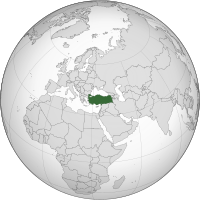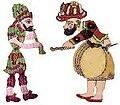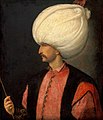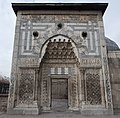Our website is made possible by displaying online advertisements to our visitors.
Please consider supporting us by disabling your ad blocker.
Portal:Turkey
Merhaba! Türkiye portalına hoş geldiniz. Hi! Welcome to the Turkey portal.
 | |

| |
Turkey, officially the Republic of Türkiye, is a country mainly located in Anatolia in West Asia, with a small part called East Thrace in Southeast Europe. It borders the Black Sea to the north; Georgia, Armenia, Azerbaijan, and Iran to the east; Iraq, Syria, and the Mediterranean Sea to the south; and the Aegean Sea, Greece, and Bulgaria to the west. Turkey is home to over 85 million people; most are ethnic Turks, while ethnic Kurds are the largest ethnic minority. Officially a secular state, Turkey has a Muslim-majority population. Ankara is Turkey's capital and second-largest city, while Istanbul is its largest city and economic and financial center. Other major cities include İzmir, Bursa, and Antalya.
Turkey was first inhabited by modern humans during the Late Paleolithic. Home to important Neolithic sites like Göbekli Tepe and some of the earliest farming areas, present-day Turkey was inhabited by various ancient peoples. The Hattians were assimilated by the Anatolian peoples, such as the Hittites. Classical Anatolia transitioned into cultural Hellenization following the conquests of Alexander the Great; Hellenization continued during the Roman and Byzantine eras. The Seljuk Turks began migrating into Anatolia in the 11th century, starting the Turkification process. The Seljuk Sultanate of Rum ruled Anatolia until the Mongol invasion in 1243, when it disintegrated into Turkish principalities. Beginning in 1299, the Ottomans united the principalities and expanded. Mehmed II conquered Constantinople (now known as Istanbul) in 1453. During the reigns of Selim I and Suleiman the Magnificent, the Ottoman Empire became a global power. From 1789 onwards, the empire saw a major transformation, reforms, and centralization while its territory declined.
In the 19th and early 20th centuries, persecution of Muslims during the Ottoman contraction and in the Russian Empire resulted in large-scale loss of life and mass migration into modern-day Turkey from the Balkans, Caucasus, and Crimea. Under the control of the Three Pashas, the Ottoman Empire entered World War I in 1914, during which the Ottoman government committed genocides against its Armenian, Greek, and Assyrian subjects. Following Ottoman defeat, the Turkish War of Independence resulted in the abolition of the sultanate and the signing of the Treaty of Lausanne. The Republic was proclaimed on 29 October 1923, modelled on the reforms initiated by the country's first president, Mustafa Kemal Atatürk. Turkey remained neutral during most of World War II, but was involved in the Korean War. Several military interventions interfered with the transition to a multi-party system.
Turkey is an upper-middle-income and emerging country; its economy is the world's 17th-largest by nominal and 12th-largest by PPP-adjusted GDP. It is a unitary presidential republic. Turkey is a founding member of the OECD, G20, and Organization of Turkic States. With a geopolitically significant location, Turkey is a regional power and an early member of NATO. An EU candidate, Turkey is part of the EU Customs Union, CoE, OIC, and TURKSOY.
Turkey has coastal plains, a high central plateau, and various mountain ranges; its climate is temperate with harsher conditions in the interior. Home to three biodiversity hotspots, Turkey is prone to frequent earthquakes and is highly vulnerable to climate change. Turkey has a universal healthcare system, growing access to education, and increasing levels of innovativeness. It is a leading TV content exporter. With 21 UNESCO World Heritage sites, 30 UNESCO intangible cultural heritage inscriptions, and a rich and diverse cuisine, Turkey is the fifth most visited country in the world. (Full article...)
Selected article -
While World War I ended for the Ottomans with the Armistice of Mudros, the Allies continued occupying land per the Sykes–Picot Agreement, and to facilitate the prosecution of former members of the Committee of Union and Progress and those involved in the Armenian genocide. Ottoman commanders therefore refused orders from the Allies and Ottoman government to disband their forces. In an atmosphere of turmoil, Sultan Mehmed VI dispatched well-respected general Mustafa Kemal Pasha (Atatürk), to restore order; however, he became an enabler and leader of Turkish Nationalist resistance. In an attempt to establish control over the power vacuum in Anatolia, the Allies agreed to launch a Greek peacekeeping force and occupy Smyrna (İzmir), inflaming sectarian tensions and beginning the Turkish War of Independence. A nationalist counter government led by Mustafa Kemal was established in Ankara when it became clear the Ottoman government was appeasing the Allies. The Allies pressured the Ottoman "Istanbul government" to suspend the Constitution, Parliament, and sign the Treaty of Sèvres, a treaty unfavorable to Turkish interests that the "Ankara government" declared illegal. (Full article...)
General images
Did you know -
- ... that Turkish-German professional boxer Hülya Şahin, the undefeated junior flyweight world champion, is the only female member of her club Universum? (September 21, 2007) Wikipedia:Recent additions 167
- ... that the female footballer Bilgin Defterli decided to go to Germany because she saw no chance to play football in Turkey due to the dissolution of women's football leagues in 2003? (December 19, 2013)
- ... that Hüseyin Özer went from living on the streets of Ankara to owning a British restaurant chain and teaching at Middlesex University? (May 24, 2012)
- ... that in 2007 Özlem Cekic

- ... that the first uterus transplantation in the world with an organ taken from a cadaver was performed by Dr. Ömer Özkan and his team at the Akdeniz University? (February 8, 2012)
- ... that Mehmet Gürs, a Turkish chef of Scandinavian descent, called his Istanbul restaurant Mikla, which is derived from Miklagard, the Viking name of the city in the 10th century? (November 15, 2012)
- ... that Matild Manukyan, a wealthy Turkish businesswoman of Armenian origin, made her fortune as a brothel owner? (March 14, 2007) Wikipedia:Recent additions 127
Selected picture
Selected biography -
Recep Tayyip Erdoğan (born 26 February 1954) is a Turkish politician who is the 12th and current president of Turkey since 2014. He previously served as the 25th prime minister from 2003 to 2014 as part of the Justice and Development Party (AKP), which he co-founded in 2001. He also served as mayor of Istanbul from 1994 to 1998.
Erdoğan was born in Beyoğlu, Istanbul, and studied at the Aksaray Academy of Economic and Commercial Sciences, before working as a consultant and senior manager in the private sector. Becoming active in local politics, he was elected Welfare Party's Beyoğlu district chair in 1984 and Istanbul chair in 1985. Following the 1994 local elections, Erdoğan was elected mayor of Istanbul. In 1998 he was convicted for inciting religious hatred and banned from politics after reciting a poem by Ziya Gökalp that compared mosques to barracks and the faithful to an army. Erdoğan was released from prison in 1999 and formed the AKP, abandoning openly Islamist policies. (Full article...)
Selected video -
Selected quote -
| “ | Everything we see in the world is the creative work of women. | ” |
Recognized content
Provinces
Related portals
Religions in Turkey
Neighbouring countries
Countries with related heritage
WikiProjects
Turkish wikipedia
 |
There is a Turkish version of Wikipedia, the free encyclopedia. |
Wikimedia
The following Wikimedia Foundation sister projects provide more on this subject:
-
Commons
Free media repository -
Wikibooks
Free textbooks and manuals -
Wikidata
Free knowledge base -
Wikinews
Free-content news -
Wikiquote
Collection of quotations -
Wikisource
Free-content library -
Wikiversity
Free learning tools -
Wikivoyage
Free travel guide -
Wiktionary
Dictionary and thesaurus
Previous Page Next Page












































































































